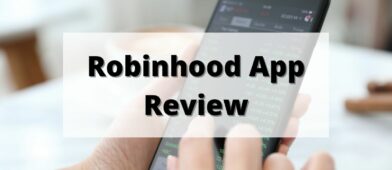Do you remember when Robinhood was founded? It was April 2013 and the idea of a smartphone app only brokerage with free trades blew everyone’s mind.
How were they going to make money?
How soon until they went under?
Fast forward six-plus years and not only is Robinhood still around but they’ve changed the industry. Free trades is almost a standard as the older brokers struggled to keep up. Cash management accounts are far more common, even though Robinhood’s first foray had some hiccups.
But if you were to point out one close competitor to Robinhood, it probably would be Webull. They don’t have as much fanfare or press but they are very similar substitutes.
Robinhood may be one of the originals and one of the largest investment platforms but Webull is a newer company but has recently built a loyal following. Both companies have taken away some of the fear of investing by offering easy-to-use products that are free from most of the fees.
So, how do Robinhood and Webull compare to each other? Let’s take a look and see how each stacks up.
Table of Contents
Robinhood vs. Webull Snapshot
| Feature | Robinhood | Webull |
|---|---|---|
| Tradable securities | Stocks, ETFs, Options, Cryptocurrencies, ADRs | Stocks, ETFs, Options, Cryptocurrencies, ADRs |
| Commission-Free Trades | Yes, $0 stocks & options | Yes, $0 stocks & options |
| Account minimums | None for brokerage & Robinhood Gold, $2,000 for margin account | None |
| Fractional shares | Yes | Yes |
| IRAs (Roth, Traditional, Rollover) | Yes | Yes |
| Trading Simulator | No | Yes |
| Free stock offer | free stock (valued $5 - $200) | up to 12 free stocks |
| Customer support | Email / social media | 24/7 phone, email, chat |
| Annual fee | None | None |
Both companies offer $0 commission trades on stock, ETF, options, and cryptocurrencies. Neither has an account minimum and both offer a bonus when you sign up with a link here.
Both Robinhood and Webull offer the ability to buy fractional shares.
Webull offers several things that Robinhood doesn’t (which is why they’re one of the best Robinhood alternatives):
- $0 commissions on short selling with margin accounts
- Trading simulator
Since Webull offers Rollover IRAs, we include them on our list of the best IRA rollover promotions.
The new customer promotional offers are slightly different too:
Now, let’s dig deeper.
What is Webull?
Webull is an all-in-one self-directed investment platform. Originally, the company was a research platform (which reflects the type of investment platform they created) whose brokerage services are provided by Webull Financial LLC. Webull released its mobile app in 2018 and has seen incredible growth since its launch.
Here is our Webull review for more information.
What is Robinhood?
Robinhood is a commission-free investment platform that is very popular. Formed in 2013, Robinhood successfully launched its app to the general public in 2015 and has worked hard to remove many of the barriers that keep people from investing.
Here is our Robinhood review for more information.
What makes Robinhood and Webull different?
Since both Robinhood and Webull are investment platforms, they share some similarities that customers will love; however, they are also very different from each other.
Let’s see what sets each of these investment apps apart from each other.
Their target user
While there’s an inherent competition between the two services, Webull and Robinhood weren’t created for the same people. Robinhood isn’t shy about promoting itself as the investment platform for beginning investors. From the app’s design to the language used, every part of Robinhood was created with beginners in mind.
Webull, on the other hand, is meant for active traders. It’s designed for intermediate and advanced users. Beginners trying to use Webull may get lost in the trade simulator, newsfeeds, financial calendars, and various other investment market data.
Investment options
Robinhood offers multiple investment options, such as commission-free investments in stocks, ETFs, and options. Robinhood also offers the unique option to invest in cryptocurrency. Users can buy and sell Bitcoin, Ethereum, Dogecoin, and others within the app. Mutual funds, bonds, and over the counter stocks aren’t available with Robinhood.
Webull is slightly more limited in its investment offerings, but they do carry 5,000 stocks and ETFs. There are also ADR investment opportunities; however, they don’t offer cryptocurrency, mutual funds, bonds, or over the counter stocks.
Platform
When it comes to the mobile app itself, Robinhood is the sleeker investment platform. Because they are targeting beginners, they worked to create a product that was aesthetically pleasing and easy to use. Unfortunately, anyone looking to research investments will have to do it ahead of time and outside of the Robinhood app as they don’t feature this type of information. Robinhood is available for mobile and web-based use.
Webull has a much clunkier interface. It might make sense to more seasoned investors, but you can tell that more thought went into the investment side of the business, not the design side. Webull is a smaller brokerage firm, so it makes sense that they weren’t able to put more effort into the design of their app. Originally, Webull was only available to mobile users, but web-based and downloadable platforms are now available.
Paid vs. free options
Another significant difference between Robinhood and Webull is what features are free and which ones cost money. For the most part, both investment platforms offer tons of free services.
Robinhood released Robinhood Gold, which is a paid account, starting at $75/year and allows users to gain access to trading on margin. There is a $2,000 minimum balance required. Other perks with Robinhood Gold are extended trading hours and bigger instant deposits.
With Webull, users can access up to 4 times their deposit in margin without paying for a monthly subscription and only pay for margin interest. There is also a minimum balance of $2,000 required with a Webull margin account. Webull doesn’t charge for extended trading hours. Something you can pay extra for with Webull is real-time global market data. Only U.S. market data is free.
Financial Calendar
A feature offered by Webull but not Robinhood is a financial calendar. Their financial calendar shows:
- What the upcoming IPOs are
- What companies are reporting earnings over the next month
- What companies are paying out dividends
This type of information may not be interesting to many investors, but active investors love this kind of information.
Customer Support
Robinhood and Webull offer their customers similar support services. Both investment platforms provide two types of support: email support and online support in the form of a help center. Only Webull offers phone support by calling 1 (888) 828-0618.
Price Alerts
Webull gives users the ability to set price alerts. Webull will send you a notification when a stock hits a specific price point that you set. Robinhood doesn’t offer price alerts.
Short Selling
Short selling is an investment strategy that involves borrowing stock or security and sells it, hoping to buy it back at a lower price to turn a profit; it’s a high-risk, high-reward strategy. Webull allows short-selling commission-free but is not an option with Robinhood.
Trading Simulator
Webull users have access to a free trading simulator. A trading simulator allows people to “practice” trading. You can test out trading strategies to see likely results. This can take out some of the risks of trading. It would make sense for a tool like a trading simulator to be present in Robinhood since its geared towards beginners, but they don’t offer one.
Account Types
Available accounts for Robinhood and Webull are similar since both offer options of cash accounts with no minimum balance. You will need the funds to make investments, but beyond that, there is no minimum. Both companies also offer margin accounts which are required to have a $2,000 minimum due to Financial Industry Regulatory Authority (FINRA) regulations.
Robinhood recently started offering retirement accounts too!
You can see that Webull offers a few more services than Robinhood. Both are free investment platforms, though. In the end, it probably depends more on what level investor you are as to which platform makes more sense to use regularly.
New Account Promotions
Finally, I never like letting a promotion dictate which service to use but in this case, both brokerages offer similar new account bonuses.
Webull will also give you a up to 12 free stocks for opening of your account and making a deposit.
Robinhood will give you free stock (valued $5 - $200) when you sign up.
Webull and Robinhood are very similar and since both offer a new account bonus, I suggest giving them both a try to see which one you like best. You can get free stock in the process!




Megan Smith says
I was ready to sign up for Robinhood but after reading the small print (terms & conditions, privacy policy) I was scared off. I understand the need for personal information such as SSN, etc. but started to get weary when they needed my bank account user name and password. Was going to think about it for a minute until I scrolled further to learn that they would also require my security questions and answers! I came to a screeching halt!! I want to explore trading options, not turn over my entire life to a company that takes from the rich, (which I am not!) and gives to the poor, (which I might be if Cinco De Mayo doesn’t soak up all of this Corona). Overall, after doing my own extensive research for about a week now, I found your article to be the most straightforward and useful as to help me narrow down choosing my first investment platform so, well done Sir, well done.
Troy says
When they ask for user/pass to bank, its for transfers. Quicken, a whole financial suite of tools, also requires that information, as they interface directly with the banks to transfer funds. So long as the company is secured from data breeches, your information would be safe.
Neil says
You can invest in some cryptocurrency. And Webull let’s you invest in some ipo’s.
Diane says
You can always open a bank account like GO2 and use it as an intermediary account between your main bank and any other e-business. That will help you manage the exact ins& out of your finances. You can deposit cash in to the intermediary account or link it with you main account, but make sure your intermediary account is fdic insured.
James says
The above poster, Megan Smith, is either clueless or dishonest. Robinhood does not require that information. They require that you establish a secure connection with your bank account and Robinhood account. A web portal is opened, but they do not see the contents of it. Zero understanding of computer systems it seems.
Dash says
100% truth.